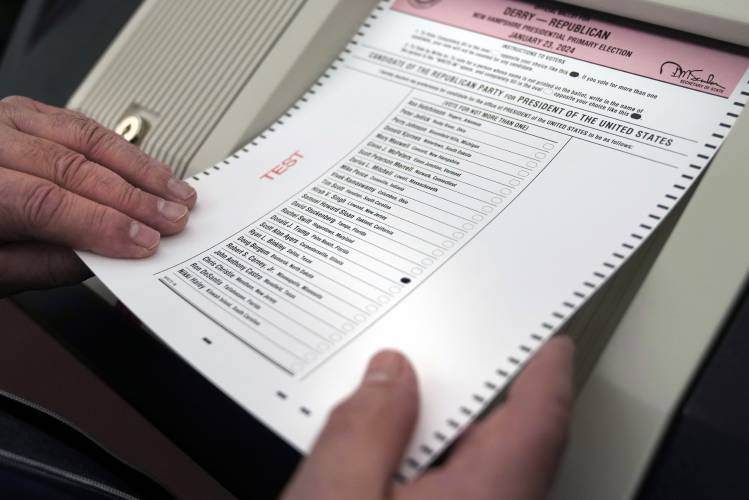Opinion: It’s time to protect, not strip away, voting rights

Nick Zaharias of Derry, N.H., a public witness, loads a test ballot into a vote counting machine while testing machines before the New Hampshire primary on Tuesday, Jan. 16. Charles Krupa/ AP
| Published: 03-14-2024 6:00 AM |
Henry Klementowicz is senior staff attorney at the ACLU of New Hampshire.
Once again, politicians in Concord are trying to make it harder for people to vote. House Bill 1569 is the most recent effort and will go to the House floor on Thursday with no recommendation after the House Election Law Committee deadlocked, 10-10. This bill would remove the sworn legal statements that people use to prove their qualifications (like age, identity, and citizenship) if they don’t have documentary proof with them when they go to register to vote.
Make no mistake, this bill would disenfranchise eligible voters. Don’t have your birth certificate or passport? Under HB 1569, too bad; you can’t register to vote. It is no exaggeration to say that thousands of people do not have documents to prove all their qualifications and instead sign a sworn statement each general election, and under this proposal, those thousands of people might not be able to vote.
Never mind that it costs more than a hundred dollars to get a passport and that birth certificates can be pricey too. In pursuit of their campaign against the phantom boogeyman of voter fraud, some state representatives are set on creating roadblocks even though everyone who has ever looked at it, from Governor Sununu to the secretary of state to the courts, all agree that our elections are safe and secure and that there is no widespread voter fraud.
Never mind too that this law is unconstitutional and would likely end up costing the state millions in legal fees if signed into law. In 2020, the Tenth Circuit Court of Appeals struck down a similar scheme in Kansas where people were required to use documents to prove their citizenship. And the last time that a voter suppression law was ruled unconstitutional here (New Hampshire Democratic Party v. Secretary of State from 2021) the state ended up paying over four million dollars in legal fees.
So why are they doing this? It’s not because of voter fraud. Even the conservative Heritage Foundation has found only one or two convictions for voter fraud in the state per year (in 2020 there were over a million votes cast between the September and November elections). And although exceedingly rare, those convictions are overwhelmingly cases of double voting, like when someone votes in New Hampshire and in Massachusetts in the same election. This bill would not even address such a double-voting situation. In my research, I couldn’t come across a single case of a non-citizen voting in New Hampshire.
This bill also will do nothing to increase voter confidence. Remember the Special Committee on Voter Confidence in 2022 by the secretary of state? The committee held meetings in excess of 37 hours and received testimony from over 400 people. It put out a huge report and made numerous recommendations on how to improve voter confidence. But none of these recommendations included making it harder to register or vote or to remove the ability of people to file sworn statements when registering.
Politicians on all sides, state officials, and the voter confidence special committee have all recognized that voter fraud in New Hampshire is extremely rare and that voter confidence in our elections is extremely high. There’s simply no good reason to erect roadblocks that could stop thousands of eligible voters from participating in our democracy.
Article continues after...
Yesterday's Most Read Articles
Voting is the cornerstone of our democracy and the fundamental right upon which all our civil liberties rest. I urge Granite Staters to take great concern with proposals to create unfounded, unnecessary barriers to that fundamental right.







 Opinion: Trumpism in a dying democracy
Opinion: Trumpism in a dying democracy Opinion: What Coolidge’s century-old decision can teach us today
Opinion: What Coolidge’s century-old decision can teach us today Opinion: The art of diplomacy
Opinion: The art of diplomacy Opinion: After Roe: Three years of resistance, care and community
Opinion: After Roe: Three years of resistance, care and community
